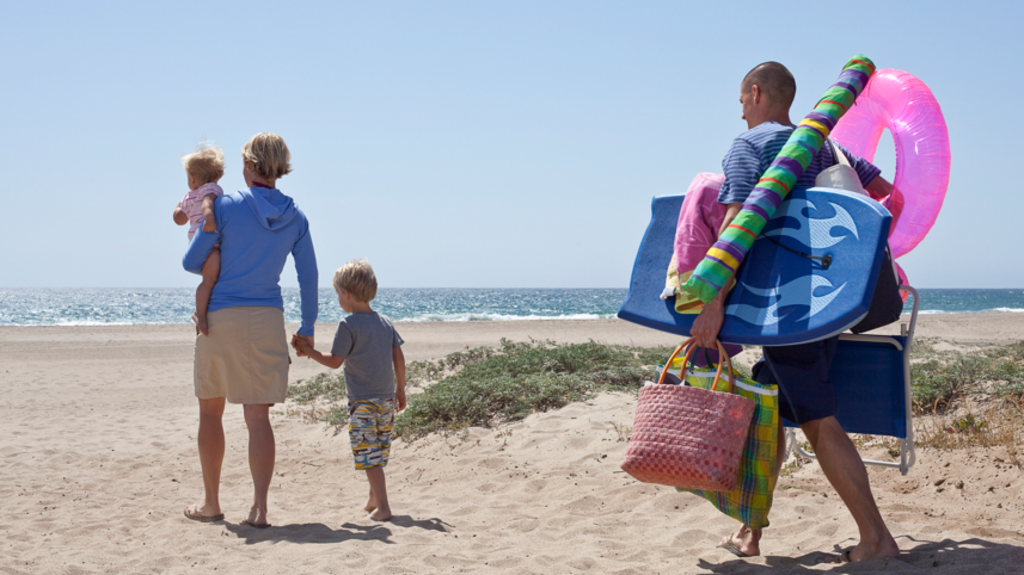The cost of all-inclusive family package holidays to popular destinations has reportedly increased significantly over the past year.
However, travelers seeking international escapes can still find ways to economize. Here are six strategies to help manage expenses.
Accommodation prices are influenced by booking timing.
July and August represent peak season for summer holidays, driven by demand from both British and other European travelers.
Sean Tipton, spokesperson for The Travel Association (ABTA), notes, “If you’ve ever been to Paris in August there’s hardly anyone there, everybody goes to the beach or heads for the mountains,” adding, “That’s when the hotels put their prices up.” Consequently, vacationing in June or September is typically more affordable.
For those restricted to peak months, Mr. Tipton advises, “It is generally a good idea to book it as early as you can.”
He acknowledges the unpredictable nature of demand but suggests that “as a rule of thumb in the majority of cases if you know you’re travelling in July, August or over Christmas or Easter, book early.”
According to Mr. Tipton, mid-week travel offers the best value.
He explains, “The weekend is the most expensive time to go because people prefer to fly over the weekend so if you fly mid-week it is generally cheaper,” further stating, “Just simple little things like that get the price down.”
This principle extends to the time of day.
Mr. Tipton states, “It is common sense really. I don’t particularly like getting up at 3am for a 6am flight and I’m not alone in that so those flights will be consequently cheaper.”
Travelers with flexible schedules may find last-minute deals.
Package holiday operators may discount unsold hotel rooms booked in advance as the travel date approaches.
Mr. Tipton explains, “They’ll discount it just to make sure they get something for it.”
He adds, “Travel agents get sent notifications of last minute good deals so they’re a good place to go if you’ve left it late and you want a good, cheap deal.”
House-swapping presents another alternative. Online platforms connect homeowners in different countries for reciprocal stays, eliminating hotel or villa costs.
Justine Palefsky, co-founder and chief executive of Kindred, notes that users pay only a service and cleaning fee.
For example, a seven-night stay in a three-bedroom house in Majorca would incur a $140 (£103) service fee to Kindred, plus $140 for cleaning.
Consumer expert Jane Hawkes advises caution when selecting a house-swap, recommending reputable sites.
She warns, “People need to be wary of social media ads at this time of year, advertising cheap holidays because scammers do tend to use those portals to show you images of a wonderful location.”
She cautions, “Then when you book it and do you bank transfer, you find it doesn’t exsist,” urging users to perform reverse image searches to verify property authenticity.
Alastair Douglas, chief executive at TotallyMoney, advises against airport currency exchange.
He states, “Airports are normally the most expensive places to change cash,” recommending advance exchange.
To mitigate exchange rate fluctuations, Mr. Douglas suggests “hedging their bets” by exchanging half in advance and half closer to the departure date.
He notes the increasing prevalence of card payments over cash, stating that “probably the thing that will save you the most amount of money” is selecting the local currency when using cards.
Pre-departure costs can accumulate. Nicky Kelvin, editor at The Points Guy website, advises printing boarding passes in advance.
He notes, “Some airlines can charge a lot of money just to print out at the airport,” cautioning, “Not all of them but just be safe.”
When bringing carry-on luggage, adhere to weight and size restrictions, verifying dimensions in the metal sizer at the airport.
Oversized or overweight luggage may incur checked baggage fees.
Ms. Hawkes recommends documenting airline-provided luggage dimensions, allowing for a post-travel complaint should discrepancies arise at the airport.
Airport food, drinks, and toiletries tend to be more expensive.
Mr. Kelvin attributes this partly to the 100ml liquid rule. While restrictions have recently been relaxed at airports in Edinburgh and Birmingham, it remains in effect elsewhere in the UK.
To save money, order sun cream or toiletries online for in-store airport pick-up post-security.
Mr. Kelvin explained to the BBC’s Morning Live programme that “it’s a double whammy – you’re going to save because you’re going to get the cheaper online pricing and you’re going to avoid the security issue because you’re going to pick up your big liquids after.”
Bringing a water bottle for refills at airport water stations can also reduce costs.
He also advises packing snacks, especially when traveling with children.
Plans for fare cap for young people had been criticised for missing out 5-15 year olds.
Councillors took a symbolic vote to oppose the plans, but it is ultimately not their decision.
The £516.50 Community Costs Bonus is brought forward from autumn to July.
Chancellor Rachel Reeves is expected to make changes to Isa rules, but what are they and how do they work?
The rollout will continue over the coming months, with some lines getting coverage for the first time.

